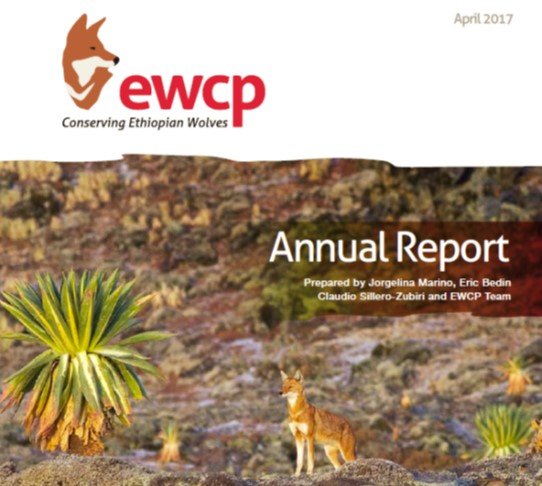


"It is always a pleasure to put together the annual report, because it makes us feel proud of our devoted team and of the diverse activities we are implementing to save this wonderful species from going extinct" Jorgelina Marino
Look at this beautiful document here, or read the summary.
EWCP Annual Report 2017 - Summary:
2016 was marked by widespread unrest in Ethiopia affecting several EWCP sites, culminating with the declaration of a state of emergency in September. In spite of the many logistic and administrative complications that ensued, most of our activities were implemented in full and with positive results. Thanks to the hard work of our Wolf Monitors we can report that wolves in Bale Mountains are on their way to recovery from recent rabies and distemper epizootics, with a 30% growth. Many pups were born, and we are confident this will translate to successful recruitment into the population. Our monitoring teams continue to expand, with more Wolf Monitors and Wolf Ambassadors recruited across the Ethiopian highlands.
To ensure that threats to wolves are detected and reported efficiently, we are providing training to staff in the Arsi, South Wollo and Simien mountains. We have also trained veterinarians from local government agencies. As epitomised by recent disease outbreaks in Delanta (the smallest wolf population), where we now find only 2 or 3 survivors, disease remains our major concern. In Bale we vaccinated over 3,300 domestic dogs in and around the National Park to prevent disease transmission, and are focusing our energy on an integrated disease management approach that will involve many actors and political support at various levels. Implementing preventive vaccination of Ethiopian wolves (rather than responding to an epizootic) remains a key objective. We also took the first steps towards promoting conservation translocations as a necessary complementary approach to ensure that no more wolf populations become extinct.
Central to our work is raising awareness for the need to protect the wolves and the Afroalpine ecosystem across Ethiopia. We worked with 35 schools and many local communities, developing and distributing information materials and holding special events (such as Wolf Day and World Rabies Day), and promoting more sustainable use of natural resources to prevent further habitat degradation. We remain highly committed to building the capacity of protected area staff, our own staff and that of partner organizations, through practical training, scholarships and supervision for Master and PhD students, and supporting research projects on the most pressing issues for wolf conservation. We are grateful to all our supporters for making implementation of our core activities possible and to develop new ones. We are delighted to be able to bring to you so many good news. As the key pressures upon the wolves are not diminishing, your help is needed as much as ever.